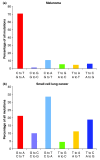Environmental exposures and mutational patterns of cancer genomes
- PMID: 20707934
- PMCID: PMC2945011
- DOI: 10.1186/gm175
Environmental exposures and mutational patterns of cancer genomes
Abstract
The etiology of most human cancers is unknown. Genetic inheritance and environmental factors are thought to have major roles, and for some types of cancer, exposure to carcinogens is a proven mechanism leading to tumorigenesis. Sequencing of entire cancer genomes has not only begun to provide clues regarding functionally relevant mutations, but has also paved the way towards understanding the initial exposures leading to DNA damage, repair and eventually to mutation of specific sequences within a cancer genome. Two recent studies of melanoma and small cell lung cancer exemplify what type of information can be gained from cancer genome sequencing.
Figures
References
-
- Fletcher O, Houlston RS. Architecture of inherited susceptibility to common cancer. Nat Rev Cancer. 2010;10:353–361. - PubMed
-
- Lichtenstein P, Holm NV, Verkasalo PK, Iliadou A, Kaprio J, Koskenvuo M, Pukkala E, Skytthe A, Hemminki K. Environmental and heritable factors in the causation of cancer - analyses of cohorts of twins from Sweden, Denmark, and Finland. N Engl J Med. 2000;343:78–85. - PubMed
-
- Leiter U, Garbe C. Epidemiology of melanoma and nonmelanoma skin cancer - the role of sunlight. Adv Exp Med Biol. 2008;624:89–103. - PubMed
-
- Hainaut P, Hollstein M. p53 and human cancer: the first ten thousand mutations. Adv Cancer Res. 2000;77:81–137. - PubMed
-
- Hussain SP, Harris CC. Molecular epidemiology of human cancer: contribution of mutation spectra studies of tumor suppressor genes. Cancer Res. 1998;58:4023–4037. - PubMed
LinkOut - more resources
Full Text Sources


